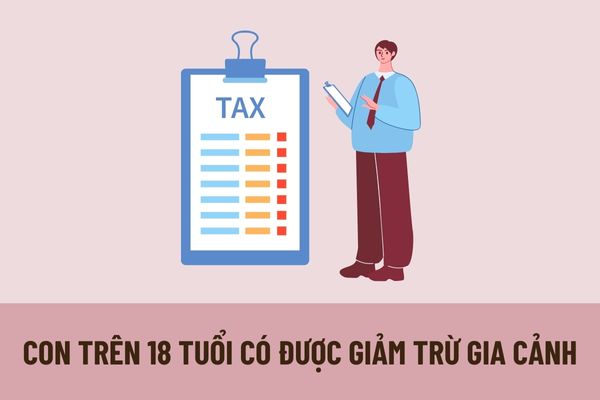When are children over 18 considered a dependant? What do documents are needed to prove dependants for children in Vietnam?
Is a child studying for a second degree considered a dependant in Vietnam?
Based on the regulations at Point d, Clause 1, Article 9 of Circular 111/2013/TT-BTC (amended by Clause 6, Article 25 of Circular 92/2015/TT-BTC), the regulations are as follows:
Deductions
d) Dependants include:
d.1) Children: biological children, legally adopted children, children born out of wedlock, stepchildren of wife, stepchildren of husband, specifically including:
d.1.1) Children under 18 years old (calculated in full months).
Example 10: Mr. H's child was born on July 25, 2014, and is counted as dependant from July 2014.
d.1.2) Children 18 years of age and older who are disabled and incapable of work.
d.1.3) Children studying in Vietnam or abroad at the university, college, vocational secondary, or vocational levels, including children 18 years of age and older still studying at high school level (including the period waiting for university exam results from June to September in grade 12) without income or with an average monthly income in the year from all income sources not exceeding 1,000,000 VND.
d.2) Spouse of the taxpayer meeting the conditions at point dd, clause 1, this Article.
d.3) Biological father, biological mother; father-in-law, mother-in-law (or father-in-law, mother-in-law); stepfather, stepmother; legal adoptive parents of the taxpayer meeting the conditions at point dd, clause 1, this Article.
d.4) Other individuals without a means of support whom the taxpayer is directly raising and meeting the conditions at point đ, clause 1, this Article, including:
d.4.1) Biological siblings of the taxpayer.
d.4.2) Paternal grandparents; maternal grandparents; aunts, uncles of the taxpayer.
d.4.3) Nephews or nieces of the taxpayer including: children of biological siblings.
d.4.4) Other individuals directly being raised as prescribed by law.
Simultaneously, based on the regulations in Article 38 of the Higher Education Law 2012 (amended by Clause 23, Article 1 of the Amended Higher Education Law 2018), the regulations are as follows:
Higher Education Degrees
1. Higher education degrees in the national education system include bachelor's, master's, doctorate degrees, and equivalent level degrees.
According to the above regulations, a second degree can be understood as follows:
When students realize they need to study another field to broaden their knowledge or because the field they graduated in does not provide desired job opportunities, they will pursue another new field of study, referred to as studying for a second degree.
Hence, studying for a second degree must follow the teaching program at the university, college, vocational secondary, or vocational levels...
Accordingly, children pursuing a second degree without income or with an average monthly income in the year from all income sources not exceeding 1,000,000 VND are still entitled to personal deductions.

When are children over 18 considered a dependant? What do documents are needed to prove dependants for children in Vietnam?
When are children over 18 considered a dependant in Vietnam?
Based on the regulations at Subsection d.1.2, Point d, Clause 1, Article 9 of Circular 111/2013/TT-BTC and Subsection d.1.3, Point d, Clause 1, Article 9 of Circular 111/2013/TT-BTC regulations are as follows:
Deductions
...
d) Dependants include:
...
d.1.2) Children 18 years of age and older who are disabled and incapable of work.
d.1.3) Children studying in Vietnam or abroad at the university, college, vocational secondary, or vocational levels, including children 18 years of age and older still studying at high school level (including the period waiting for university exam results from June to September in grade 12) without income or with an average monthly income in the year from all income sources not exceeding 1,000,000 VND.
Based on the above regulations, children over 18 years old are eligible for personal deductions when they fall into the following cases:
- Children 18 years of age and older who are disabled and incapable of work.
- Children studying in university, college, vocational secondary, or vocational levels, including children 18 years of age and older still studying at high school level (including the period waiting for university exam results from June to September in grade 12) in Vietnam or abroad without income or with an average monthly income in the year from all income sources not exceeding 1,000,000 VND.
What documents are needed to prove dependants for children in Vietnam?
Based on the regulations at Point g, Clause 1, Article 9 of Circular 111/2013/TT-BTC (amended by Article 1 of Circular 79/2022/TT-BTC), the documents needed to prove dependants for children include:
- Children under 18 years old: Proof documents are photocopies of the Birth Certificate and photocopies of the Citizen's ID Card or Identity Card (if any).
- Children 18 years of age and older who are disabled, incapable of work, proof documents include:
- Photocopies of the Birth Certificate and photocopies of the Citizen's ID Card or Identity Card (if any).
- Photocopy of the Disability Certificate as prescribed by law on persons with disabilities.
- Children studying at higher education levels as guided at Subsection d.1.3, Point d, Clause 1, this Article, proof documents include:
- Photocopy of the Birth Certificate.
- Photocopy of the Student Card or a declaration confirmed by the school or other documents proving study at universities, colleges, vocational secondary, high schools, or vocational training centers.
- In the case of adopted children, children born out of wedlock, stepchildren, apart from the specific documents in each case mentioned above, additional documents to prove the relationship are needed, such as a photocopy of the decision recognizing the adoption, or the decision recognizing paternity/maternity issued by a competent state authority.
LawNet